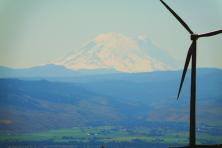This is Part 3 of a series on the Climate Workgroup in Washington. View Part 1 - Part 2 - Part 4.
Investor and climate activist Tom Steyer is keen on saying that “American business will shock you with how it can crush environmental problems.” (Tom is keynoting the Climate Solutions Annual Dinner in Portland.) He says we need to create markets and send price signals for business to invest, innovate and create jobs that help solve our climate and energy crisis. The Northwest’s neighbors to the north, British Columbia, and south, California, have already followed this advice.
With Governor Inslee and the state legislators on the Climate Workgroup examining how Washington State can reduce carbon pollution and grow the economy, now is a great time to look at how two major climate policies, carbon pricing and a clean fuels standard, have fared up and down the West Coast.
Clean Fuels drive energy dollars back into the local economy
Part of the landmark climate bill enacted in 2008, AB32, California’s clean fuels standard is responsible for significant pollution reductions, particularly from the transportation sector. Five years into the policy, it’s becoming clear that the clean fuel standard is alsoresponsible for establishing new markets and spurring investment into innovative technologies. In a remarkably short time, a company called Clean Energy Fuels has started selling transportation fuels derived from landfill methane at an industrial scale, led by competitive pricing and demand for clean-burning fuels. Here in Washington, we spend nearly $15 billion on transportation fuel and almost all of it leaves the state. If we had a clean fuels standard like California’s, we would create markets for homegrown energy, creating jobs and funneling those “energy dollars” back into our economy. And in a state like ours, where half our climate pollution comes from our trucks and cars, the climate benefits of cleaner fuels couldn’t be more apparent.
Accounting for climate pollution provides an economic win in British Columbia
British Columbia has had a price on carbon, via a carbon tax, since 2008, and after five years the results show “an environmental and economic success story.” The tax has worked just as intended, reducing carbon pollution, while maintaining economic growth. Since 2008, BC reduced its carbon pollution at a rate nearly 9 times greater the rest of Canada, while its economy bested the national rate.

Importantly, while petroleum sales have increased in the rest of Canada, British Columbian oil use has been in steady decline. Putting a price on carbon pollution has been good for the BC environment and economy.
This is all about what we should be doing here in the Northwest. In California a clean fuels standard is creating jobs and growing investment while reducing transportation-related pollution while BC has cut their emissions while strengthening the overall economy. Think what these two policies could do for Washington where transportation fuels account for a big chunk of our carbon pollution—and our bills. Putting a price on carbon and enacting a clean fuels standard are the way for us to cut pollution and build the clean energy economy of tomorrow, bolstered by the success of our partners along the Pacific Coast.



